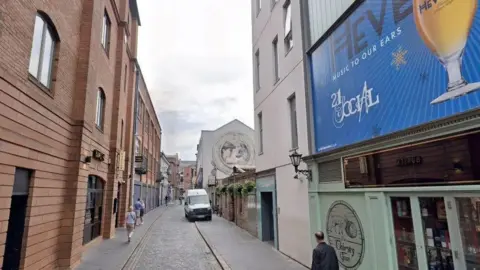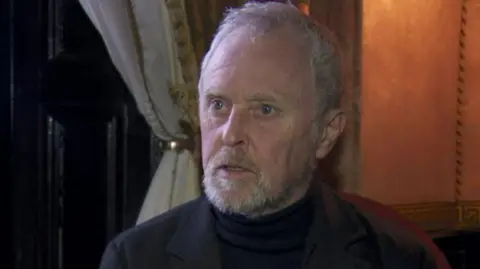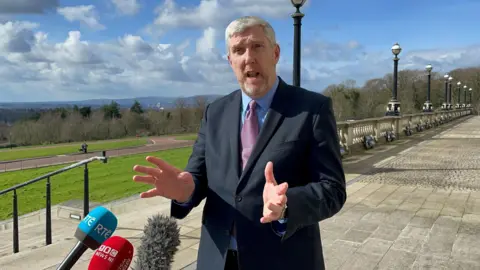Cathedral Quarter street car ban put on hold
 Google Maps
Google MapsPlans to ban cars from a cobbled street in a popular Belfast nightlife area have been "put on hold", Northern Ireland's infrastructure minister has said.
Hill Street, which contains several bars and restaurants, was pedestrianised for a trial period in 2020 during the Covid-19 pandemic.
But plans to permanently close the Cathedral Quarter street to vehicles have faced years of delays.
John O'Dowd said the proposals had been paused due to "several competing work priorities".
The Sinn Féin minister also blamed "underfunding and austerity by the British government", according to a letter seen by BBC News NI.
In March, O'Dowd said his department was proposing to re-pedestrianise most of the street, allowing only service access for local businesses.
A one-way system would be introduced from the north end of Hill Street and into Gordon Street under the plans.
In an update to the Stormont assembly, O'Dowd said: "Officials will keep the position under review and recommence work as soon as resources are available."
'Dither and delay'
Democratic Unionist Party assembly member Phillip Brett said the "dither and delay" was "frankly unacceptable".
Brett, who submitted a written assembly question on the issue, said the pedestrianisation should be "easy and straightforward".
"Despite over four years of discussions, the department is no further on and has now paused the scheme. This is simply a shocking state of affairs," he said.
"The Cathedral Quarter is a vital component of the night-time economy and cultural heart of Belfast city centre, and the lack of ambition from the department to support its continued growth is hugely disappointing."

Bill Wolsey, who owns a chain of hotels, pubs and pizzerias across Northern Ireland, said a road as busy as Hill Street should be pedestrianised.
Speaking on BBC News NI's Evening Extra programme, Mr Wolsey pointed to safety concerns for those who use the street to access services in the area.
"There’s a benefit to the citizens of Belfast that this street is given back to them in a pedestrianised way and they can walk up it in a safe environment," he said.
"The cost of this should not be an excuse.
"We need to take some action now because the street gets busier and busier."
'Missed opportunity'
 PA Media
PA MediaIn a letter sent to Cathedral Quarter Business Improvement District (BID) in July, O'Dowd said he could not give a timescale for the plans.
"My department has been operating in a difficult financial environment for a number of years due to underfunding and austerity by the British government," he said.
"Unfortunately, given the current workload, competing business priorities, and reduced staffing levels, it is likely that the pedestrianisation of Hill Street will not progress as quickly as we would wish, and delivery of the scheme will be delayed."
Damien Corr, manager of Cathedral Quarter BID, described it as a "missed opportunity".
"It was nearly a done deal. We can't see how there was much more left to do," he said.
He expressed confusion over how any financial constraints in the Department for Infrastructure could delay the project.
"We can't see what the cost of this is. It's not as if we have to dig the road up," he added.
"We have offered to help in any way we can, and we have invited the minister down to the site."